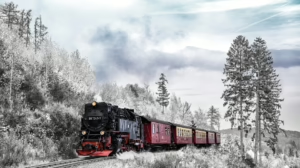Okay, buckle up! This is going to be a long and comprehensive piece. I’ll do my best to structure it logically and engagingly, but remember, it’s designed to be a deep dive.
From City Life to Country Calm: The Best Rural Escapes
Introduction: The Allure of the Rural
In an era defined by the relentless hum of technology, the cacophony of urban environments, and the ever-present pressure to be “connected,” it’s no surprise that more and more people are feeling the pull towards a simpler, more serene existence. The romantic vision of rural life, once dismissed as a nostalgic fantasy, is experiencing a powerful resurgence. From young professionals seeking a slower pace to families yearning for more space and connection with nature, the countryside is beckoning with its promise of tranquility and rejuvenation.
This yearning for a rural escape is not merely a whimsical desire; it’s a response to the growing awareness of the toll that modern city living takes on our mental and physical well-being. The constant stimulation, the pollution, the lack of green spaces, and the relentless competition can lead to stress, anxiety, and a sense of disconnect from the natural world. The countryside, in contrast, offers a respite from these pressures, providing an opportunity to reconnect with ourselves, our families, and the environment.
But what exactly constitutes a “rural escape”? It’s more than just a change of scenery; it’s a shift in lifestyle, a conscious decision to prioritize well-being, and a commitment to embracing a different set of values. It’s about trading the concrete jungle for rolling hills, the crowded commute for peaceful walks, and the constant demands of modern life for the simple pleasures of nature.
This article aims to explore the multifaceted appeal of rural escapes, examining the benefits, the challenges, and the diverse options available to those seeking a change of pace. We will delve into the psychological and physical advantages of living in a rural environment, explore the different types of rural escapes, from weekend getaways to permanent relocations, and offer practical advice on how to make the transition successfully. Ultimately, we hope to provide you with the inspiration and information you need to embark on your own journey from city life to country calm.
Part 1: The Psychological and Physical Benefits of Rural Living
The benefits of escaping to the countryside extend far beyond a superficial appreciation of scenic views. Extensive research has demonstrated that exposure to nature and rural environments can have a profound impact on our mental and physical health.
1. Stress Reduction and Mental Well-being:
The most immediate and noticeable benefit of a rural escape is the reduction of stress. The absence of constant noise, pollution, and the relentless pace of city life allows the nervous system to relax and recover. Studies have shown that spending time in nature can lower cortisol levels, the hormone associated with stress[modern_footnote_source]. Furthermore, the visual beauty of the countryside, the sounds of birdsong, and the fresh air can have a calming and restorative effect on the mind.
-
Nature and Cognitive Function: Exposure to natural environments has been linked to improved cognitive function, including attention span, memory, and creativity. Studies suggest that spending time in nature can reduce mental fatigue and improve our ability to focus[modern_footnote_source]. This is particularly beneficial for individuals who work in demanding or stressful professions.
-
Reduced Anxiety and Depression: The countryside can provide a sense of peace and tranquility that is often lacking in urban environments. The absence of constant stimulation and the opportunity to connect with nature can help to alleviate symptoms of anxiety and depression. Research has shown that spending time in green spaces can boost mood and promote feelings of well-being[modern_footnote_source].
-
Enhanced Mindfulness: The slower pace of rural life encourages a greater sense of mindfulness and presence. Without the constant distractions of the city, it becomes easier to appreciate the simple things in life, such as the beauty of a sunset, the sound of rain, or the smell of fresh earth. This increased awareness can lead to a greater sense of contentment and fulfillment.
2. Physical Health and Well-being:
The benefits of rural living extend beyond mental well-being to encompass physical health as well. The opportunity for outdoor activities, the access to fresh air and clean water, and the healthier food options all contribute to a more active and healthier lifestyle.
-
Increased Physical Activity: Rural environments often offer ample opportunities for outdoor activities, such as hiking, cycling, swimming, gardening, and horseback riding. These activities can improve cardiovascular health, strengthen muscles and bones, and help to maintain a healthy weight. The simple act of walking in nature can provide a significant boost to physical fitness[modern_footnote_source].
-
Improved Air Quality: Compared to urban environments, rural areas typically have significantly better air quality. This is due to the absence of heavy traffic, industrial pollution, and the presence of more green spaces. Breathing cleaner air can improve respiratory health and reduce the risk of developing respiratory illnesses.
-
Access to Fresh, Local Food: Rural areas often have a thriving agricultural sector, providing access to fresh, locally grown fruits, vegetables, and other produce. Eating locally sourced food can be more nutritious and flavorful than food that has been transported long distances. It also supports local farmers and reduces the environmental impact of food production.
-
Stronger Immune System: Exposure to a wider variety of microbes in the natural environment can help to strengthen the immune system. Studies have shown that children who grow up in rural areas are less likely to develop allergies and asthma[modern_footnote_source].
3. Social Benefits and Community Connection:
While often perceived as isolating, rural living can actually foster stronger social connections and a greater sense of community. The slower pace of life allows for more meaningful interactions with neighbors and friends, and the shared experiences of rural life can create a strong bond between community members.
-
Stronger Community Bonds: In rural areas, people often rely on each other more than they do in cities. This can lead to a stronger sense of community and a greater willingness to help neighbors in need. Local events, such as farmers markets, festivals, and community gatherings, provide opportunities for people to connect and build relationships.
-
Reduced Social Isolation: Despite the perception of rural areas as being isolated, studies have shown that people who live in rural communities often experience less social isolation than those who live in cities. This is due to the stronger community bonds and the greater availability of social support networks.
-
Intergenerational Connections: Rural areas often have a higher proportion of older residents than cities. This can lead to more opportunities for intergenerational connections, which can benefit both younger and older generations. Older residents can share their knowledge and experience with younger residents, while younger residents can provide companionship and support to older residents.
Part 2: Types of Rural Escapes: From Weekend Getaways to Permanent Relocation
The concept of a “rural escape” can encompass a wide range of experiences, from a short weekend break to a permanent relocation. The best type of escape for you will depend on your individual needs, preferences, and circumstances.
1. Weekend Getaways and Short Breaks:
For those who are not yet ready to make a permanent move to the countryside, weekend getaways and short breaks offer a taste of rural life and a chance to recharge and reconnect with nature.
-
Farm Stays and Bed & Breakfasts: Farm stays and bed & breakfasts provide a unique opportunity to experience rural life firsthand. Guests can participate in farm activities, such as feeding animals, harvesting crops, and learning about sustainable farming practices. Bed & breakfasts offer a more relaxed and comfortable experience, with cozy rooms, delicious breakfasts, and personalized service.
-
Cabin Rentals and Holiday Homes: Cabin rentals and holiday homes provide a more private and self-contained option for a rural escape. These accommodations often come with fully equipped kitchens, living areas, and outdoor spaces, allowing guests to relax and enjoy the peace and quiet of the countryside.
-
Camping and Glamping: Camping and glamping offer a more adventurous and immersive experience in nature. Camping involves pitching a tent and sleeping outdoors, while glamping provides a more luxurious and comfortable camping experience, with amenities such as comfortable beds, private bathrooms, and cooking facilities.
2. Temporary Relocations: Sabbaticals and Extended Stays:
For those who are looking for a more immersive and transformative experience, temporary relocations, such as sabbaticals and extended stays, can provide a deeper connection with rural life.
-
Sabbaticals and Career Breaks: Taking a sabbatical or career break can provide the time and space to explore a different lifestyle and pursue personal interests. Spending this time in a rural environment can be a rejuvenating and transformative experience.
-
Remote Work and Digital Nomadism: The rise of remote work has made it possible for many people to live and work from anywhere in the world. Choosing a rural location for remote work can provide a more peaceful and productive work environment.
-
Volunteer Opportunities and Work Exchanges: Volunteering or participating in work exchanges in rural areas can provide a unique opportunity to learn new skills, contribute to local communities, and experience a different way of life.
3. Permanent Relocations: Making the Move to the Country:
For those who are ready to embrace a complete lifestyle change, a permanent relocation to the countryside can be a fulfilling and rewarding experience.
-
Retirement and Downsizing: Many people choose to retire to the countryside to enjoy a more relaxed and peaceful lifestyle. Downsizing from a larger home in the city to a smaller home in the country can free up time and resources to pursue hobbies and interests.
-
Raising a Family in a Rural Environment: For families with young children, a rural environment can offer a safer and more enriching upbringing. Children can benefit from the fresh air, open spaces, and close-knit community.
-
Pursuing a Rural Business or Lifestyle: Some people choose to relocate to the countryside to start a farm, open a bed & breakfast, or pursue other rural-based businesses or lifestyles. This can provide a sense of purpose and fulfillment.
Part 3: Choosing the Right Rural Escape: Factors to Consider
Selecting the right rural escape requires careful consideration of your individual needs, preferences, and circumstances. Here are some key factors to consider:
1. Lifestyle and Preferences:
-
Desired Level of Isolation: Do you crave complete solitude and tranquility, or do you prefer to be close to amenities and social activities? Some rural areas are very remote, while others are located near small towns or villages.
-
Outdoor Activities: What types of outdoor activities do you enjoy? Consider whether the area offers opportunities for hiking, cycling, swimming, fishing, hunting, or other activities that are important to you.
-
Climate and Weather: The climate and weather can have a significant impact on your enjoyment of rural life. Consider whether you prefer a warm, sunny climate or a cooler, more temperate climate.
-
Interests and Hobbies: What are your interests and hobbies? Consider whether the area offers opportunities to pursue your interests, such as gardening, birdwatching, photography, or painting.
2. Practical Considerations:
-
Budget and Affordability: The cost of living can vary significantly between different rural areas. Consider your budget and choose an area that is affordable for you.
-
Accessibility and Transportation: How easy is it to access the area? Consider the distance to major cities, airports, and other transportation hubs. Also, consider whether you will need a car to get around.
-
Healthcare and Medical Facilities: Access to healthcare is an important consideration, especially for those with pre-existing medical conditions. Consider the proximity of hospitals, doctors’ offices, and other medical facilities.
-
Internet and Communication: In today’s world, reliable internet access is often essential. Consider the availability and speed of internet service in the area.
-
Job Opportunities (for permanent relocations): If you are planning a permanent relocation, consider the availability of job opportunities in the area. Research the local economy and identify potential employers.
3. Community and Culture:
-
Local Culture and Values: Every rural community has its own unique culture and values. Consider whether you feel comfortable with the local culture and whether your values align with those of the community.
-
Community Events and Activities: Consider the availability of community events and activities, such as festivals, farmers markets, and social gatherings. These events can provide opportunities to connect with other members of the community.
-
Diversity and Inclusion: Consider the diversity and inclusion of the community. Are you comfortable living in a community where everyone is the same, or do you prefer a more diverse and inclusive environment?
Part 4: Making the Transition: Tips for a Successful Rural Escape
Transitioning from city life to country calm can be a challenging but rewarding experience. Here are some tips to help you make the transition successfully:
1. Do Your Research:
-
Visit the Area: Before making any major decisions, visit the area you are considering for a rural escape. Spend some time exploring the local towns and villages, talking to residents, and getting a feel for the local culture.
-
Talk to Locals: Talk to people who already live in the area and ask them about their experiences. This can provide valuable insights into the realities of rural life.
-
Research the Local Economy: If you are planning a permanent relocation, research the local economy and identify potential job opportunities.
2. Prepare Financially:
-
Create a Budget: Create a budget that reflects the cost of living in the area you are considering. Factor in expenses such as housing, transportation, food, and utilities.
-
Save Money: Save enough money to cover your expenses for the first few months after your move. This will give you time to settle in and find work if necessary.
-
Consider a Trial Run: If possible, consider renting a place in the area for a short period of time before making a permanent commitment. This will give you a chance to experience rural life firsthand and decide whether it is right for you.
3. Embrace the Community:
-
Get Involved: Get involved in the local community by volunteering, joining clubs, or attending local events. This is a great way to meet people and build relationships.
-
Support Local Businesses: Support local businesses by shopping at farmers markets, eating at local restaurants, and using local services.
-
Be Open-Minded: Be open-minded and willing to learn about the local culture and traditions.
4. Adjust Your Expectations:
-
Things Will Be Different: Be prepared for things to be different in the countryside than in the city. The pace of life will be slower, and you may have to adjust to a different set of social norms.
-
There Will Be Challenges: Rural life is not without its challenges. Be prepared to deal with issues such as limited access to amenities, unreliable internet access, and a lack of diversity.
-
Be Patient: It takes time to adjust to a new environment. Be patient with yourself and allow yourself time to settle in and feel comfortable.
5. Practical Skills and Considerations:
-
Basic Home Maintenance: In rural areas, you may need to be more self-sufficient in terms of home maintenance and repairs. Learning basic skills like plumbing, carpentry, and gardening can be invaluable.
-
Gardening and Food Preservation: Consider learning how to grow your own food and preserve it through canning, freezing, or drying. This can save you money and provide you with fresh, healthy food.
-
Driving Skills: If you are moving to a rural area where public transportation is limited, you will need to be comfortable driving in all types of weather conditions.
-
Emergency Preparedness: Rural areas can be more vulnerable to natural disasters and power outages. Be sure to have a plan in place for emergencies and stock up on essential supplies.
Part 5: The Future of Rural Escapes: Trends and Predictions
The trend towards rural escapes is likely to continue in the coming years, driven by a number of factors, including:
-
Increasing Urbanization: As cities become increasingly crowded and expensive, more people will be drawn to the相对affordable and peaceful lifestyle of rural areas.
-
The Rise of Remote Work: The increasing prevalence of remote work is making it possible for more people to live and work from anywhere in the world, including rural areas.
-
Growing Awareness of the Benefits of Nature: As people become more aware of the psychological and physical benefits of spending time in nature, they will be more likely to seek out rural environments.
-
Concerns About Sustainability and Environmental Issues: A growing concern for the environment is leading more people to seek out sustainable and eco-friendly lifestyles, which are often more readily available in rural areas.
Predictions for the Future:
-
Increased Demand for Rural Housing: The demand for rural housing is likely to increase, leading to higher property values and increased competition for available properties.
-
Development of Rural Amenities: As more people move to rural areas, there will be increased demand for amenities such as restaurants, shops, and cultural attractions.
-
Investment in Rural Infrastructure: Governments and private companies will likely invest in rural infrastructure, such as roads, internet access, and healthcare facilities, to support the growing rural population.
-
Growth of Rural Tourism: Rural tourism will likely continue to grow as more people seek out authentic and immersive experiences in the countryside.
-
Renewed Focus on Local Food Systems: There will be a renewed focus on local food systems, with more people growing their own food and supporting local farmers.
Part 6: Notable Rural Escape Destinations Around the World
The allure of rural life is universal, and there are countless destinations around the world that offer idyllic settings and opportunities for a peaceful escape. Here are a few notable examples:
-
The Cotswolds, England: Rolling hills, charming villages, and historic architecture define this quintessentially English landscape. It’s a popular destination for weekend getaways and longer stays, offering a blend of natural beauty and cultural attractions.
-
Tuscany, Italy: Vineyards, olive groves, and hilltop towns create a postcard-perfect scene in Tuscany. It’s renowned for its food, wine, and art, offering a rich cultural experience alongside a tranquil atmosphere.
-
Provence, France: Lavender fields, sun-drenched landscapes, and picturesque villages characterize Provence. It’s a haven for artists, writers, and anyone seeking a slower pace of life and inspiration from nature.
-
The Scottish Highlands, Scotland: Rugged mountains, vast lochs, and ancient castles define the dramatic landscape of the Scottish Highlands. It’s a paradise for outdoor enthusiasts, offering opportunities for hiking, fishing, and wildlife watching.
-
The Finger Lakes, New York, USA: Sparkling lakes, rolling hills, and vineyards make up the picturesque Finger Lakes region. It’s a popular destination for wine tasting, outdoor recreation, and relaxation.
-
The Blue Ridge Mountains, USA: Stretching across several states, the Blue Ridge Mountains offer stunning scenery, charming towns, and a rich cultural heritage. It’s a popular destination for hiking, camping, and exploring the Appalachian Trail.
-
New Zealand: With its diverse landscapes, from snow-capped mountains to pristine beaches, New Zealand offers a wealth of rural escape opportunities. It’s a haven for adventure seekers and nature lovers.
-
Bali, Indonesia: Lush rice paddies, volcanic mountains, and vibrant culture make Bali a unique rural escape destination. It’s known for its spiritual atmosphere, yoga retreats, and eco-friendly living.
-
The Algarve, Portugal: Stunning coastline, charming fishing villages, and rolling hills define the Algarve region. It offers a blend of beaches, natural beauty, and cultural attractions.
These are just a few examples, and the best rural escape destination for you will depend on your personal preferences and interests.
Part 7: Rural Skills and Hobbies to Enhance Your Escape
Embracing new skills and hobbies is a great way to deepen your connection to rural life and enhance your overall experience. Here are some ideas:
-
Gardening: Growing your own food is a rewarding and sustainable practice. Start with a small vegetable garden or herb garden and gradually expand your knowledge and skills. Learn about composting, soil health, and organic gardening techniques.
-
Preserving Food: Canning, freezing, pickling, and drying are all ways to preserve the bounty of your garden or local farmers market. These skills allow you to enjoy seasonal produce year-round and reduce food waste.
-
Beekeeping: Keeping bees is a fascinating hobby that provides you with honey, beeswax, and other valuable products. It also helps to support the local ecosystem by pollinating plants.
-
Chicken Keeping: Raising chickens is a great way to have fresh eggs and learn about animal husbandry. Chickens also help to control pests in your garden and provide valuable fertilizer.
-
Woodworking: Learning basic woodworking skills can be incredibly useful for building furniture, making repairs, and creating decorative items for your home.
-
Blacksmithing: Blacksmithing is a traditional craft that involves shaping metal using heat and tools. It’s a challenging but rewarding skill that allows you to create unique and functional objects.
-
Knitting and Crochet: Knitting and crochet are relaxing and creative hobbies that allow you to create warm and cozy clothing, blankets, and other items.
-
Photography: Capturing the beauty of the rural landscape through photography is a great way to appreciate your surroundings and share your experiences with others.
-
Birdwatching: Learning to identify different bird species and observe their behavior can be a fascinating and rewarding hobby.
-
Foraging: Learning to identify and harvest edible wild plants and mushrooms can provide you with fresh, seasonal food and connect you with the natural world. (Important: always consult with an expert before consuming any wild plants or mushrooms, as some species are poisonous.)
-
Fishing: Fishing is a popular pastime in many rural areas, providing a source of food and a connection with nature.
Part 8: Overcoming Challenges and Addressing Concerns
While rural life offers many benefits, it’s important to acknowledge and address potential challenges and concerns:
-
Limited Access to Amenities: Rural areas often have limited access to amenities such as shops, restaurants, and cultural attractions. Be prepared to travel further for these things. Consider online shopping and exploring local farmers’ markets and community events.
-
Slower Pace of Life: The slower pace of life can be a welcome change for some, but it can also be frustrating for those used to the hustle and bustle of the city. Learn to embrace the slower pace and appreciate the simple things in life.
-
Social Isolation: It can be challenging to build relationships in a new community, especially if you are an introvert. Get involved in local activities, volunteer, and be open to meeting new people.
-
Limited Job Opportunities: Job opportunities may be limited in rural areas, so it’s important to research the local economy and consider remote work options or starting your own business.
-
Financial Considerations: Be realistic about your financial situation and create a budget that reflects the cost of living in your chosen rural area. Consider the potential costs of home maintenance, transportation, and healthcare.
-
Healthcare Access: Access to healthcare can be limited in rural areas, so it’s important to research the availability of doctors, hospitals, and other medical facilities.
-
Technology Access: Reliable internet access may be limited in some rural areas. Research the availability of internet service providers and consider alternative options such as satellite internet.
-
Adapting to a Different Culture: Rural communities often have their own unique cultures and values. Be respectful of local customs and traditions, and be willing to learn and adapt.
-
Homesickness: It’s normal to experience homesickness, especially during the initial transition period. Stay connected with friends and family, and focus on the positive aspects of your new life.
-
Wildlife Encounters: Be aware of the local wildlife and take precautions to protect yourself and your property. Learn about the local flora and fauna and how to coexist peacefully with them.
Part 9: Case Studies and Inspiring Stories
Reading about others who have successfully made the transition from city life to country calm can be inspiring and provide valuable insights. Here are a few examples of case studies and inspiring stories:
-
The Couple Who Left Their Corporate Jobs to Start a Farm: Many stories exist of couples who traded their high-pressure corporate careers for the challenges and rewards of farming. They often cite a desire for a more meaningful life, a connection with nature, and the opportunity to work together as a family. They often face challenges like long hours, financial uncertainty, and learning new skills, but find the rewards of growing their own food and building a sustainable lifestyle to be well worth the effort.
-
The Family Who Homeschools Their Children in a Rural Setting: For families seeking a more personalized and enriching education for their children, homeschooling in a rural setting can be a great option. Children can benefit from the freedom to explore nature, learn at their own pace, and develop a strong connection to their community.
-
The Retiree Who Finds Purpose and Fulfillment in Rural Volunteering: Retirement can be a time for new beginnings and opportunities to give back to the community. Many retirees find purpose and fulfillment by volunteering in rural areas, whether it’s working with animals, assisting at local schools, or helping to preserve the natural environment.
-
The Digital Nomad Who Works Remotely from a Remote Cabin: The rise of remote work has made it possible for many people to live and work from anywhere in the world. Digital nomads can enjoy the peace and tranquility of a remote cabin while still earning a living and pursuing their passions.
-
The Artist Who Finds Inspiration in the Rural Landscape: Many artists find inspiration in the beauty and tranquility of rural landscapes. They may be drawn to the natural light, the vibrant colors, or the sense of peace and solitude.
Conclusion: Embracing the Call of the Country
The allure of rural escapes is undeniable. In a world increasingly characterized by stress, noise, and disconnection, the countryside offers a sanctuary of peace, tranquility, and connection with nature. The benefits of rural living extend far beyond a superficial appreciation of scenic views, encompassing profound improvements in mental and physical well-being, stronger social connections, and a more meaningful and fulfilling lifestyle.
While the transition from city life to country calm can be challenging, the rewards are well worth the effort. By carefully considering your needs and preferences, preparing financially, embracing the community, and adjusting your expectations, you can create a successful and enriching rural escape.
Whether you’re seeking a weekend getaway, a temporary relocation, or a permanent move, the call of the country is a powerful one. Embrace the opportunity to reconnect with nature, rediscover yourself, and create a life that is more aligned with your values and aspirations. The countryside is waiting, ready to welcome you with open arms and offer you a chance to experience the simple joys of life.
The promise of a slower pace, a deeper connection to nature, and a stronger sense of community is enticing. As technology advances and allows for greater flexibility in where we work and live, the appeal of rural escapes will only continue to grow. So, take a deep breath of fresh air, listen to the birdsong, and consider whether a rural escape might be the right path for you. The journey from city life to country calm could be the most transformative and rewarding experience of your life.
I hope this comprehensive article has provided you with valuable information and inspiration. Remember to do your research, plan carefully, and embrace the journey! Good luck on your path to country calm.


























Add Comment